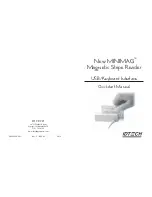
User's Guide HDSPe RayDAT
© RME
57
24.14 Level Meter
The HDSPe RayDAT calculates all the display values Peak, Over and RMS in hardware, in
order to be capable of using them independent of the software in use, and to significantly re-
duce the CPU load.
Tip:
This feature, the
Hardware Level Meter
, is used by
DIGICheck
(see chapter 16) to display
Peak/RMS level meters of all channels, nearly without any CPU load.
The level meters integrated in TotalMix - considering their size - cannot be compared with
DIGICheck. Nevertheless they already include many useful functions.
Peak and RMS is displayed for every channel. 'Level Meter Setup' (menu Options or F2) and
direct keyboard entry (
hotkeys
) make various options available:
•
Display range 40 or 60 dB (
hotkey 4 or 6
)
•
Release time of the Peak display (Fast/Medium/Slow)
•
Numerical display selectable either Peak or RMS (
Hotkey E or R
)
•
Number of consecutive samples for Overload display (1 to 15)
•
RMS display absolute or relative to 0 dBFS (
Hotkey 3 or 0
)
The latter is a point often overlooked, but
nonetheless important. A RMS measurement
shows 3 dB less for sine signals. While this is
mathematically correct, it is not very
reasonable for a level meter. Therefore the
RMS readout is usually corrected by 3 dB, so
that a full scale sine signal shows 0 dBFS on
both Peak and RMS meters.
This setting also yields directly readable signal-
to-noise values. Otherwise the value shown
with noise is 3 dB better than it actually is
(because the reference is not 0 dB, but -3 dB).
The value displayed in the text field is
independent of the setting 40/60 dB, it
represents the full 24 bit range of the RMS
measurement. An example: A
RME ADI-8 QS
connected to the HDSPe RayDAT’s ADAT
input will show around -114 dBFS on all eight
input level meters.
This level display of TotalMix also provides means for a constant monitoring of the signal qual-
ity. Thus it can be a valuable tool for sound optimization and error removal in the studio.
Measuring SNR (Signal to Noise) is best done with RME’s free software DIGICheck. The
function Bit Statistic includes three different RMS meters for exactly this purpose (RMS
unweighted, A-weighted and DC).
Summary of Contents for Hammerfall HDSPe RayDAT
Page 5: ...User s Guide HDSPe RayDAT RME 5 User s Guide HDSPe RayDAT General...
Page 38: ...38 User s Guide HDSPe RayDAT RME...
Page 39: ...User s Guide HDSPe RayDAT RME 39 User s Guide HDSPe RayDAT Connections and TotalMix...
Page 46: ...46 User s Guide HDSPe RayDAT RME...
Page 68: ...68 User s Guide HDSPe RayDAT RME...
Page 69: ...User s Guide HDSPe RayDAT RME 69 User s Guide HDSPe RayDAT Technical Reference...
















































